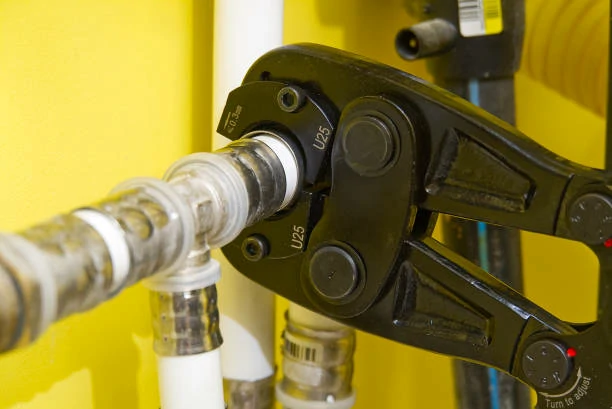PEX (cross-linked polyethylene) pipes have revolutionized the plumbing industry with their versatility, durability, and ease of installation. This comprehensive guide covers everything you need to know about PEX pipes, including their uses, benefits, and installation tips.
1. What is PEX?
PEX is a flexible plastic pipe used in plumbing and heating systems. It is made from high-density polyethylene and goes through a cross-linking process to enhance its strength and flexibility.
2. Types of PEX
PEX-A: Offers the highest flexibility and freeze resistance. It is ideal for residential plumbing and radiant heating systems.
PEX-B: Less flexible than PEX-A but still suitable for most plumbing applications. It is cost-effective and widely used.
PEX-C: The least flexible but still reliable for various applications. It is produced through a different cross-linking method.
3. Common Uses of PEX Pipes
Residential Plumbing: PEX pipes are commonly used in residential plumbing systems for both hot and cold water supply. Their flexibility makes them easy to install in tight spaces and around obstacles.
Radiant Floor Heating: PEX is the preferred material for radiant floor heating systems. Its ability to withstand high temperatures and its flexibility make it ideal for these applications.
Snow Melting Systems: PEX pipes are used in snow melting systems for driveways and walkways. They efficiently circulate heated water to melt snow and ice.
Fire Sprinkler Systems: PEX can be used in residential fire sprinkler systems. Its flexibility allows for easy installation and retrofitting.
4. Benefits of PEX Pipes
Flexibility: PEX pipes can bend around corners and obstacles, reducing the need for fittings and joints.
Durability: PEX is resistant to scale, chlorine, and corrosion, ensuring a long lifespan.
Cost-Effective: PEX pipes and fittings are generally more affordable than traditional materials like copper.
Easy Installation: PEX pipes are lightweight and easy to cut, making installation quicker and less labor-intensive.
Freeze Resistance: PEX can expand slightly when frozen, reducing the risk of bursting.
5. Installation Methods
Crimp Fittings: Crimp fittings use a crimp ring and a crimping tool to secure the connection. This method is reliable and commonly used.
Clamp Fittings: Clamp fittings use a stainless steel clamp and a clamp tool. It is an alternative to crimp fittings and is equally effective.
Push-Fit Fittings: Push-fit fittings allow for quick and easy connections without the need for special tools. They are ideal for DIY installations.
Expansion Fittings: Expansion fittings use an expansion tool to enlarge the pipe end before inserting the fitting. This method provides a secure and leak-free connection.
6. PEX vs. Traditional Materials
PEX vs. Copper: PEX is more affordable, easier to install, and resistant to corrosion compared to copper. However, copper can withstand higher temperatures and pressures.
PEX vs. PVC: PEX is more flexible and resistant to freezing than PVC. PVC is generally used for drainage and venting rather than potable water supply.
7. Best Practices for PEX Installation
Use Manifolds: Manifolds allow for individual control of each fixture, simplifying repairs and maintenance.
Proper Insulation: Insulate PEX pipes in unheated areas to prevent freezing and heat loss.
Secure Piping: Use appropriate supports and clamps to secure PEX pipes and prevent movement and stress.
Avoid Direct Sunlight: PEX is sensitive to UV light. Avoid prolonged exposure to sunlight during storage and installation.
Follow Manufacturer Guidelines: Adhere to the manufacturer’s recommendations for installation tools and techniques to ensure a reliable system.
8. Maintenance and Repair
Regular Inspection: Periodically inspect PEX pipes for signs of wear, damage, or leaks. Address any issues promptly.
Repair Kits: Use PEX repair kits for minor leaks or damage. These kits include couplings and tools for quick fixes.
Replace Damaged Sections: If a section of the pipe is severely damaged, cut out the damaged portion and replace it with a new piece using appropriate fittings.
9. Environmental Considerations
Recyclable Material: PEX is recyclable, though not as widely recycled as some other materials. Check local recycling programs for options.
Energy Efficiency: PEX’s insulation properties contribute to energy efficiency in heating systems, reducing overall energy consumption.
10. Future Trends
Smart Home Integration: Integration with smart home systems for leak detection and automatic shut-off valves.
Enhanced Materials: Ongoing research into more durable and flexible materials for improved performance.
Wider Acceptance: Growing acceptance of PEX in commercial and industrial applications due to its benefits.
Conclusion
PEX pipes offer numerous advantages for modern plumbing and heating systems, including flexibility, durability, and ease of installation. Their wide range of applications, from residential plumbing to radiant heating, makes them a versatile choice for various projects. By understanding the different types of PEX, installation methods, and best practices, you can ensure a reliable and efficient plumbing system.
Connect
IFAN is a Chinese manufacturer of plastic pipes, fittings and valves with 30 years of experience. If you are interest in IFAN copper fittings, copper valves, plastic pipes and fittings, please contact us. IFAN offers you a variety of standard pipes to meet your specific needs. Click below to learn more about IFAN’s wide range of affordable and cost-effective valve products and piping system related products.
We will reply your email or fax within 24 hours.
You can call us at any time if there is any question on our production.
For more information,pls visit our webside https://ifanpro.com/
Pls Mailto: [email protected]
Whatsapp: + 86 19857948982














Recent Comments